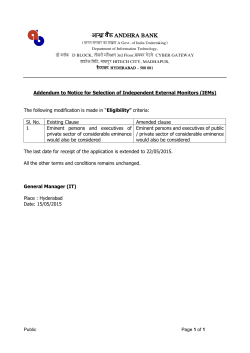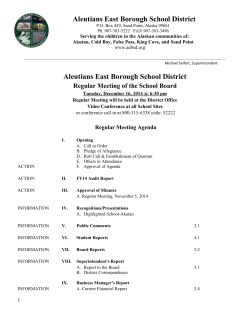
Honorary report, item 504. PDF 113 KB
24 March 2015 Extraordinary Council Honorary Titles – Honorary Alderwomen and Honorary Aldermen and Honorary Freewomen and Honorary Freemen Report of: Christopher Potter – Monitoring Officer and Head of Support Services Wards Affected: All This report is: Public 1. Executive Summary 1.1 A special meeting of the Council has been called in order to confer honorary titles under section 249 of the Local Government Act 1972. 2. Recommendation(s) 2.1 That in pursuance of section 249(1) of the Local Government Act 1972 and in recognition of the Council being of the opinion that eminent services have been rendered to the Council by former Councillors Valerie Fletcher and Anne Long, the Council confers on each of them the title of Honorary Alderwoman. 2.2 That, in pursuance of section 249(1) of the Local Government Act 1972 and in recognition of the Council being of the opinion that eminent services have been rendered to the Council by former Councillors Derek Hardy, Keith Brown (of Ingatestone), David Minns, and Ken Wright, the Council confers on each of them the title of Honorary Alderman. 2.3 That, in pursuance of section 249(5) of the Local Government Act 1972 and in recognition of being persons of distinction and persons who have, in the opinion of the Council, rendered eminent services to the Borough, the Council admits 124 Essex Transport Squadron for that body to hold the honorary title to exercise the Freedom of the Borough and the associated traditional right of Freedom of Entry with the right to march with bayonets fixed, band playing and colours flying. 2.4 That, in pursuance of section 249(5) of the Local Government Act 1972 and in recognition of being a person of distinction and a person who has, in the opinion of the Council, rendered eminent services to the Borough, the Council admits Jane Bennett to be an Honorary Freewoman of the Borough. 2.5 That in pursuance of section 249(5) of the Local Government Act 1972 and in recognition of being a person of distinction and a person who has, in the opinion of the Council, rendered eminent services to the Borough, the Council admits John Wyndham to be Honorary Freeman of the Borough. 3. Introduction and Background 3.1 The titles of ‘Honorary Alderwomen’ or ‘Honorary Aldermen’ are as the names suggest honorary and are conferred in recognition of eminent past services to the Council. 3.2 The role attracts no remuneration and involves no entitlement to take part in decision-making. The last vestige of the time when “aldermen” did have a decision-making role was swept away by the Local Government Act 1972. 3.3 Holders of such titles may attend and take part in such civic ceremonies as the Council may from time to time decide, but shall not, as such, have the right to attend meetings of the Council or their Committees or to receive any allowances or other payments. 3.4 The Council also can recognise distinguished service to the Borough through admission to the honorary title of ‘Honorary Freewoman’ or ‘Honorary Freeman’ of the Borough. 3.5 The title is honorary only and is one of the highest honours that the Council can bestow. 3.6 It is through this means that organisations are awarded the Freedom of the Borough. Traditionally this honour is associated with the right of Freedom of Entry for military units with the right to march, with bayonets fixed, band playing and colours flying. 4. Issue, Options and Analysis of Options 4.1 To be eligible for the honorary title of Honorary Alderwoman or Honorary Alderman, the person nominated must be a former councillor of this Council and not be currently a member of the Council. In addition, the person nominated must in the opinion of the Council have rendered ‘eminent services to the council’. 4.2 There is no minimum number and there is no maximum of Alderwomen or Aldermen which is or which can be laid down. 4.3 The sole legal criterion for a past member is of having rendered ‘eminent services to the council’. As the term is not defined in the Act and there is no statutory guidance or assistance to councils at a national level in determining what it might mean, it is for the Council to decide locally what constitutes ‘eminent services to the council’. 4.4 ‘Eminent’ has a dictionary meaning which includes ‘highly regarded’ and ‘distinguished’. 4.5 ‘Eminent services’ connotes making a positive difference or impact over and above the carrying out of mere normal council duties to a basic or acceptable standard i.e. being ‘distinguished’ for proper reasons and in the service to the Council. 4.6 The legislation therefore deliberately fails to give a national definition beyond the words ‘eminent services’ and leaves it for a local decision by councillors and to be an exercise of discretion at the time a decision is called for, based ‘on the opinion of the Council’ with such power being properly exercised. It is thus determined by ‘quality’, not necessarily ‘quantity’. Innovation and excellence, for example, can be recognised. 4.7 In reality the bestowal of the legal title of ‘Honorary Alderwoman’ or ‘Honorary Alderman’ is by way of a distinguished service award. 4.8 It is not a long-service award. Whilst it has been known for a number of Councils to use ‘length of service’ (such as, for example, 12 years or 15 years) as a good enough measure of the ‘eminent services’, this is patently wrong. It is self-evidently the case that there will be members who serve out their time in public service in a perfectly satisfactory manner without being ‘eminent’. The criterion is not “buggin’s turn”. A ‘length of service’ criterion of itself is unlawful as it fetters the Council’s discretion when determining ‘eminent services to the council’. Not only is ‘length of service’ not the criterion in the Act but it also does nothing to enhance public confidence in local government and democracy to use such a measure as time served. 4.9 It is not a party political honour. The criterion is not support for a particular political party or group. It is ‘eminent services to the council’ which means that any past political differences should be ignored in making an assessment of a past councillor’s service contribution to the Council. 4.10 It is not an award for having simply held a senior Council position when a councillor. The mere fact that a councillor held a senior position or positions is not evidence of the provision of eminent services to the Council. This would be to confuse ‘appointment’ to a position with ‘outcome’. It is therefore not a senior appointment reward. Senior responsibility allowances in the Members’ Allowance Scheme are designed to support those in senior positions. The honorary title is not part of the package. 4.11 The questions to be answered are: (1) What services did the person provide as a councillor to the Council during whatever time they served? (2) Where those services, in the opinion of the Council, ‘eminent services to the Council’? 4.12 Each nomination will therefore be determined on its merits, purely assessed against the sole criterion of having rendered ‘eminent services to the council.’ 4.13 To be eligible to be admitted as an Honorary Freewoman or Honorary Freeman, those nominated must be persons of distinction and persons who have, in the opinion of the Council, rendered eminent services to the place or area i.e. the Borough. 4.14 Again there is no definition in the Act other than the words used. It is thus for the Council to decide locally what constitutes “distinction”. 4.15 “Distinction” has a dictionary meaning of ‘a marked difference or contrast’ or ‘excellence that sets someone apart from others’. 4.16 “Eminent services” need to relate to the Borough, not the Council, in the context of whether to admit as an Honorary Freewoman or Honorary Freeman. 4.17 The Freedom of the Borough with the traditionally associated Freedom of Entry is nowadays achieved through the use of section 249 of the Local Government Act 1972 to admit the organisation to the honorary title of ‘Freewoman or Freeman’ of the Borough. 5. Reasons for Recommendation 5.1 The Council wishes to recognise those who merit the highest awards that the Council can bestow on a person or organisation. 6. Consultation 6.1 Members were asked to put forward suitable nominations. 7. References to Corporate Plan 7.1 None. 8. Implications Financial Implications Name & Title: Chris Leslie, Financial Services Manager and Section 151 Officer Tel & Email: 01277/ 312542 /chris.leslie@brentwood.gov.uk 8.1 There are no direct financial implications arising from this report. Legal Implications Name & Title: Christopher Potter, Monitoring Officer and Head of Support Services Tel & Email: 01277/ 312860 / Christopher.Potter@brentwood.gov.uk 8.2 Section 249(1) of the Local Government Act 1972 enables the Council by resolution to confer the title of Honorary Alderwoman or Honorary Alderman at a meeting of the Council specially convened with notice of the object but such a resolution must be passed by not less than twothirds of the Members voting at that meeting if the resolution is to be effective. 8.3 Section 249(5) of the Local Government Act 1972 enables the Council by resolution to admit as an Honorary Freewoman or Honorary Freeman at a meeting of the Council specially convened with notice of the object but under section 249(8) of that Act such a resolution must be passed by not less than two-thirds of the Members voting at that meeting if the resolution is to be effective. 8.4 The relevant criteria are set out in the body of the report. Other Implications (where significant) – i.e. Health and Safety, Asset Management, Equality and Diversity, Risk Management, Section 17 – Crime & Disorder, Sustainability, ICT. 8.5 None. 9. Background Papers (include their location and identify whether any are exempt or protected by copyright) 9.1 Nomination forms submitted. 10. Appendices to this report None. Report Author Contact Details: Name: Telephone: E-mail: Christopher Potter – Monitoring Officer and Head of Support Services 01277 312860 christopher.potter@brentwood.gov.uk
© Copyright 2025










